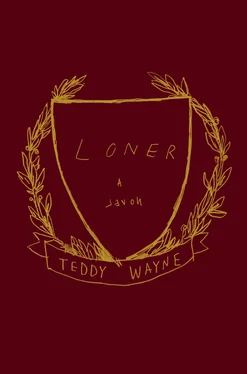A professor, his white hair fringing a dome that shone brilliantly under the lights, fiddled with his notes at the podium. The syllabus was distributed: From Ahab to Prufrock: Tragically Flawed Hero(in)es in American Literature, 1850–1929.
Throughout the eighty-five-minute lecture I was riveted on you and only you, the professor’s voice droning like talk radio in the background. You composed notes in longhand, scribbling in your Harvard-insignia blue spiral notebook, periodically snake flicking your tongue between your lips to moisturize them before flexing the angle of your mandible. At one point you massaged your nape, precipitating a delicate flurry of dandruff that drifted onto your shoulders, becoming a constellation of stars on the night sky of your sweater.
When you tilted your head in my direction to work out a knot, I looked at my laptop screen and busily typed Professor Jonathan Samuelson’s last insight, about how the whiteness of the whale in Moby-Dick enables it to stand for anything in the minds of both Ahab and the reader.
“Its very blankness, the colossal void it imposes on the text, reifies a central tension of post — Manifest Destiny American literature,” he proclaimed with closed eyes and an upturned head, as though channeling his wisdom from above. “The twinned desires of narrative and of capitalism. The populist author entices the ravenous reader via withheld information to keep him wanting more and more, just as the free market promises additional capital to seduce the never-satisfied worker. To quote Blake, ‘Those who restrain desire, do so because theirs is weak enough to be restrained…’ Anyone know the rest? TFs?”
One of the graduate teaching fellows who had helped hand out the syllabus spoke up from the back of the room. “ ‘And the restrainer or reason usurps its place & governs the unwilling,’ ” he recited behind a trim sandy beard and tortoiseshell glasses. “ ‘And being restrain’d, it by degrees becomes passive, till it is only the shadow of desire.’ ”
At the end of the lecture Samuelson announced that those planning on taking the class should sign up online for one of the four graduate student — led weekly discussion sections. I had no way of knowing which one you’d be in — assuming you even remained in the course.
You slipped out ahead of me. By the time I exited the building you were traversing the Yard, your over-the-shoulder bag — its handsomely distressed leather standing out in a sea of gaudily zippered backpacks and nonprofit-logoed totes — rhythmically colliding against your hip.
I stopped and prodded at my phone when you crossed paths with one of your dining hall friends, a sharp-faced, nearly translucent girl with blond hair (Jen Pelletier, East Eighty-Seventh Street in New York; a fellow alumna of the Chapin School). You each pulled out a pack of cigarettes and lit one, in defiance of the Yard’s tobacco-free policy. That was the end of your competitive running days, I surmised, not without some disappointment; I liked imagining you extricating yourself from your social circle to log hours on a chilly outdoor track, the masochistic introversion of the middle-distance runner.
And yet there was something attractive about it, a yesteryear femininity to the way you handled the cigarette. I held up my phone, zoomed in with the camera, and snapped. It caught you with a plume of smoke escaping your mouth, your lips in a perfect O. After you stamped out the butts, Jen parted with an air kiss and you continued on to Sever Hall.
Our next class was an intimate seminar. I entered the room a few students after you, and not a moment too soon, as the professor asked if I would shut the door behind me. There was only one (clearly gay) male at the oval table. Everyone looked at me as if my presence were unwelcome, a grotesque insect crawling over their lovely picnic spread.
The professor, a thirtyish woman with cat’s-eye glasses and the edge of a tattoo peeking out of her jacket sleeve, reminded the class that if they were here it meant they had already signed up for the freshman seminar Gender and the Consumerist Impulse. Enrollment in the seminars was restricted to twelve. I counted thirteen students in the room.
I was sitting halfway between you and the professor, which meant I couldn’t look at you — this time I was in your line of vision. As the professor lectured during a slideshow on print ads of the 1970s, I devoted all my energy to appearing attentive, knowledgeable, and passionate , nodding along after brief pauses as if I were mulling each comment and giving it my carefully considered imprimatur.
She opened the seminar up to discussion. A girl to my right raised her hand.
“The magnification of feminine mouths in many of the ads seems to be about isolating the one non-taboo main orifice,” she said. “The female mouth takes in edible objects that substitute for the phallus.”
“Absolutely,” the professor said. “Male mouths are rarely eroticized. They typically function as a tool to imply speech or some other form of power.”
Here was my opening, a place where I felt slightly more comfortable speaking than in an orientation session or dorm entryway. I came up with a line to simultaneously flaunt my intellect and cleverness. Crisp , I reminded myself. Crisp.
“But then you might say that the Marlboro Man ads are an example of pathetic fallacy ,” I said, referring to the campaign that had just been on-screen.
I leaned back in my chair and folded my arms, waiting for approving laughter. The silence was disconcerting.
“How so?” the professor asked.
No wonder — if she hadn’t even understood the terms of the joke, there was little chance the students could.
“Pathetic fallacy is the attribution of human emotion to nature,” I explained. At least her ignorance gave me another opportunity to demonstrate my knowledge, perhaps secure my spot in the seminar.
“Right,” she said. “And how does that relate to the Marlboro Man?”
The room suddenly felt very warm. “Well, he’s in nature, and he has a small cigarette in his mouth.”
“I’m afraid I don’t follow,” she said. “Unless you were just making a pun on ‘pathetic fallacy’ and ‘pathetic phallus’?”
I nodded and swallowed. The professor, stony-faced, called on another student. A disaster, worse than if I’d made an earnestly inane observation. I clammed up for the rest of the class. You didn’t talk, either.
When the seminar ended I didn’t follow you to your next destination. Though I was loath to let you out of my sight, I needed to speak to the professor.
“Excuse me,” I said as she gathered her notes. “I didn’t sign up for this seminar and I know you’re at the size limit, but I’m very passionate about the subject and would be happy to write my application essay now.”
I felt pinned by her glare, which seemed to convey her presumption that I, as a male whose signifiers (to borrow a word she used repeatedly) pointed to heterosexuality, was not here out of academic integrity but for some nefarious agenda.
“There’s a wait list,” she said, zipping up her bag. “If you don’t get in, I’ll also be teaching this next semester.”
One more student would hardly upset the equilibrium; how bureaucratically compliant for someone with a tattoo and a professed interest in “nonnormative modes of intersectionality.” I could only hope that one of the students would be scared off by the daunting syllabus, which culminated in a lengthy “anthropological study requiring local fieldwork.”
You didn’t eat lunch in Annenberg the rest of the week, foiling my designs to duplicate your course load. In addition to the English lecture, I ended up registering for the art history class I’d shopped; the massive introductory economics course; and a philosophy/psychology class, Ethical Reasoning 22: The Self and the Other.
Читать дальше












